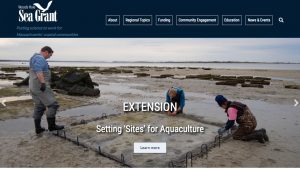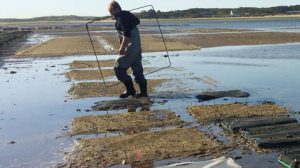Search results for: looking%2520cheap%2520airline%2520tickets%2520phone%2520number%25201-800-299-7264/feed/wp-content/uploads/sites/106/2018/06/GrainSize-234x300.jpg
New Woods Hole Sea Grant Website
Woods Hole Sea Grant has a new look and a new URL — seagrant.whoi.edu. Take a few minutes to browse our new website and update your bookmarks. We’re eager for any feedback you might have. Email us at seagrant@whoi.edu.
Read MoreAugust 2020 Coastal Impacts Newsletter
Coastal Impacts Woods Hole Sea Grant Newsletter AUGUST 2020 CONTENTS WHSG Supports Seven Diversity, Equity and Inclusion Projects 12 Weeks, Thousands of Kids: How NOAA Live! Connected Students to Science at Home Woods Hole Sea Grant Sponsors Three for Knauss Fellowship Is There a Market for Shucked Oysters? Eat an Oyster, Support a Local…
Read MoreMolecular Analysis of a RAPD Marker (B20) Reveals Two Microsatellites and Differential mRNA Expression in Penaeus vannamei
Molecular Analysis of a RAPD Marker (B20) Reveals Two Microsatellites and Differential mRNA Expression in Penaeus vannamei Garcia, D.K., A.K. Dhar, and A. Alcivar-Warren Molecular Marine Biology and Biotechnology, Vol. 5, No. 1, pp. 71-83, 1996 WHOI-R-96-001
Read MoreSurf Clams
Surf Clams In the marketplace, one-year-old surf clams are known as “New England Butter Clams” – a relatively new product on the market. Farming New England Butter Clams means they can be harvested at a size in which they are tender, buttery and sweet – as well as easy and versatile to prepare. This results…
Read MoreStudy Provides Measurement of Nitrogen Removal by Local Shellfish
Towns along Cape Cod and the Islands are looking to shellfish not only as tasty culinary treats, but also for help cleaning up waters degraded by excess nitrogen in the region. While nitrogen is essential for all plants and animals, too much nitrogen in ponds and waterways—often caused by fertilizer runoff and septic tanks—can fuel…
Read MoreNew Shoreline Change Data Reveal Massachusetts is Eroding
New Shoreline Change Data Reveal Massachusetts is Eroding Helpful to educators and students. O’Connell, J.F. Marine Extension Bulletin, 4 pp., 2003 WHOI-G-03-001
Read MoreCellular Localization of CYP3A Proteins in Various Tissues from Pilot Whale (Globicephala melas)
Cellular Localization of CYP3A Proteins in Various Tissues from Pilot Whale (Globicephala melas) Celander, M.C., M.J. Moore, and J.J. Stegeman Environmental Toxicology and Pharmacology, Vol. 8, pp. 245-253, 2000 WHOI-R-00-009
Read MoreTechnology Enables Better HAB Monitoring and Mapping
Technology Enables Better HAB Monitoring and Mapping The project’s sampling plan for the Nauset area of Cape Cod. Sept. 2018 — Nauset Marsh in Eastham, Mass. on Cape Cod serves as a “natural laboratory” for researchers working to better understand harmful algal blooms (HABs) or red tide. HABs in Nauset are caused by the phytoplankton…
Read MoreBulletin: New Shoreline Change Data Reveal Massachusetts is Eroding
Bulletin: New Shoreline Change Data Reveal Massachusetts is Eroding Approximately 75 percent of the U.S. ocean shoreline is eroding. Massachusetts’ ocean-facing shore is no exception. A recent study of shoreline change in Massachusetts by the U.S. Geological Survey, Woods Hole Oceanographic Institution Sea Grant Program, and Cape Cod Cooperative Extension reveals that approximately 68 percent,…
Read MoreKnauss Fellow Profile: Jennifer Kenyon
WHOI Sea Grant caught up with 2022 Knauss Fellow Jennifer Kenyon to learn a few things about her year with the Bureau of Ocean Energy Management (BOEM) and even a few things some of her friends might not know about her!
Read More


